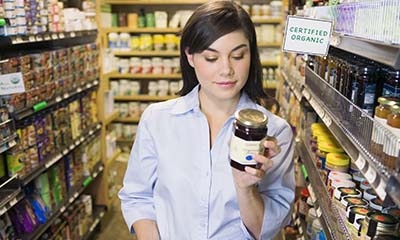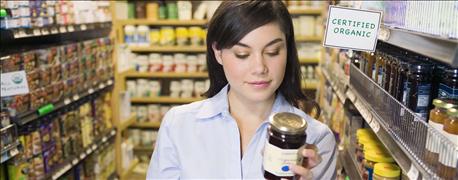February 25, 2016

Updated: Meeting postponed until next week.
The American Farm Bureau Federation’s board of directors voted Feb. 23 to support efforts of Senate Agriculture Committee Chairman Pat Roberts, R-Kan., to move forward with a GMO labeling bill.
“The Senate Agriculture Committee this week is marking up a bill to provide American consumers a wealth of easily accessible, accurate information about GMOs through a voluntary, national GMO labeling program,” said AFBF president Zippy Duvall. “The bill would pre-empt a patchwork of mandatory and misleading state GMO labeling laws founded more on scare-tactics than science, and we must move this process forward.”

The Senate Agriculture Committee will discuss a bill Thursday regarding labeling food containing GMOs.(Photo: Jupiter Images/Thinkstock)
The Senate Agriculture Committee meeting set for Feb. 25 to consider Roberts' proposal for a national voluntary labeling standard for foods made with genetically modified organisms has been postponed until next week.
Roberts released a discussion draft on Feb. 19. It amends the Agricultural Marketing Act of 1946 to add a “National Voluntary Bioengineered Food Labeling Standard.”
Roberts’ legislation directs the agriculture secretary to establish a national voluntary bio-engineered food labeling standard for food within two years of enactment. The labeling standard covers bioengineered food and any food that may contain bioengineered food. The legislation also allows USDA to establish requirements and procedures to carry out the standard. It doesn’t allow any claim to be made about the food’s quality or safety based upon its bioengineering status. It does call for USDA to conduct an outreach and education campaign on the safety of GMOs.
Under Roberts’ draft proposal, states aren’t allowed to have their own standard.
A coalition of agricultural interests are calling upon Congress to act before the Vermont labeling law goes into effect July 1.
“Farmers, businesses and American families are counting on Congress to pass a uniform, national labeling standard for foods made with genetically modified organisms as quickly as possible because Vermont’s state labeling mandate goes into effect in July,” said Claire Parker, Coalition for Safe Affordable Food spokesperson, in a media statement.
Vermont’s labeling law was adopted in 2014. It calls for labeling of any food product “entirely or partially produced with genetic engineering.”
Connecticut and Maine have also passed GMO labeling laws, but they don’t go into effect until more states have adopted similar legislation.
A study conducted by New York City-based economic consulting firm John Dunham & Associates and released by the Corn Refiners Association says that the Vermont law could increase the price of groceries by $50 to $1,050 annually.
The key findings:
-At a minimum, the law costs about $50 per family for label changes, or $3.8 billion. Costs rise as manufacturers reformulate products to use non-GMO ingredients. Switching to non-GMO ingredients is estimated to cost $1,050 per family, or $81.9 billion, annually.
-American food manufacturers are expected to pass on the costs to comply with the labeling law. This is expected to increase average food prices 1.76 percent in the first year. The survey predicts these higher grocery costs will continue in the years ahead with a total cost of $13,250 per household over 20 years.
-The Vermont law is expected to affect low-income families disproportionately with the study finding the increase attributable to the law will take nearly 2.5% of the median income of the poorest fifth of the population.
Campbell Soup Company favors mandatory national labeling. -- >>>
~~~PAGE_BREAK_HERE~~~
“At a time when 48 million Americans are already struggling with food insecurity, Congress cannot allow one state to implement an unprecedented labeling law that will significantly raise food costs for families across the country,” said CFSAF’s spokesperson Parker.
But Just Label It says the Roberts’ proposal keeps consumers in the dark and refers to it as the DARK Act.
“Allowing food companies to make voluntary disclosures will simply perpetuate the status quo that has left consumers in the dark,” said Gary Hirshberg, chairman of Just Label It and Stonyfield Farm, in a media statement. “Nine out of ten consumers — regardless of age, income or even party affiliation — want the right to know whether their food contains GMOs, and food leaders like Campbells have shown that mandatory GMO labeling will not increase food prices.”
Campbell Soup Company announced in January that it will support mandatory national GMO labeling for all foods and beverages regulated by the Food and Drug Administration and the U.S. Department of Agriculture. Vermont’s legislation applies only to food regulated by the FDA, so products with meat and poultry are not included in the labeling requirement.
“Campbell is optimistic a federal solution can be established in a reasonable amount of time if all the interested stakeholders cooperate,” the company said in a statement. “However, if that is not the case, Campbell is prepared to label all of its U.S. products for the presence of ingredients that were derived from GMOs, not just those required by pending legislation in Vermont.”
The National Grain and Feed Association said, in a media statement, that there is a demonstrated need for a national, uniform solution, but they don’t support labeling because it could stigmatize products made with GMOs.
“If states create different labeling rules, food and feed manufacturers would be forced to either not serve that market or transfer the heavy costs of compliance to consumers,” said NGFA president Randy Gordon. “A national standard also would avoid the potential for labels to have different meanings in different states, which would lead to even greater costs and further confuse consumers."
The American Soybean Association said it’s urgent to find a path forward.
“We’ve heard repeatedly that Americans want more information on what’s in their food, and we are invested in providing that information to them,” said ASA president Richard Wilkins, a farmer from Greenwood, Del. “Chairman Roberts’ bill is one that moves the food production industry in a direction of greater transparency, while at the same time protecting farmers’ ability to use what science has repeatedly proven to be a safe and sustainable technology.”
The National Corn Growers Association echoed the ASA’s comments, calling for action.
“The introduction of Roberts’s proposal is an important first step to restoring sanity to America’s food labeling laws,” said National Corn Growers Association president Chip Bowling, a farmer from Maryland. “Important food safety and labeling decisions should be made by the scientists and qualified policymakers at the FDA, not political activists and campaigns.”
The American Seed Trade Association says it will continue to advocate for a uniform, national solution based on sound science.
“Consumers and the food and agriculture community alike deserve consistency and transparency in the marketplace,” said ASTA president and CEO Andrew LaVigne in a media statement.
Read more:
Fortune - Big Food accused of 'elaborate scheme' to kill GMO labeling effort - The nation's largest food companies are under fire for failing to be transparent.
Politico - Can Roberts get Democrats to sign onto GMO labeling bill? - It's unclear if Democrats will be able to ignore pressure from pro-labeling groups unhappy with the measure.
You May Also Like




